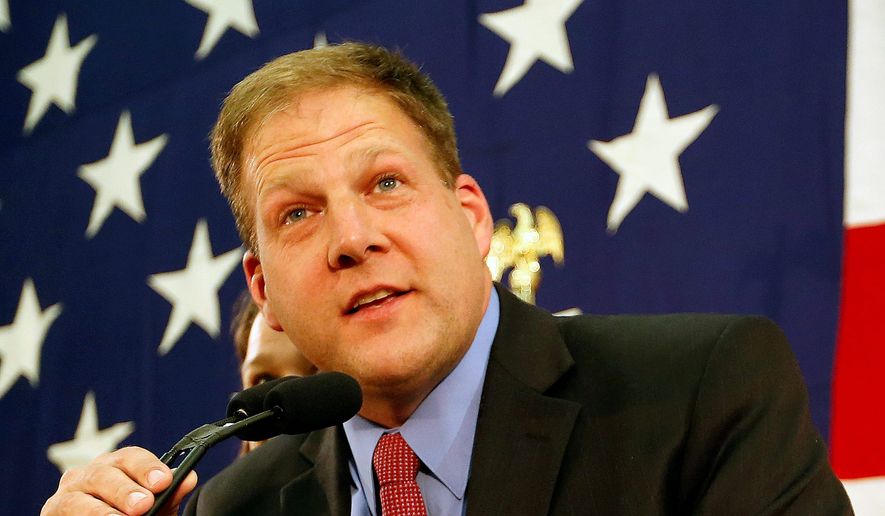DENVER | Republicans built on their gubernatorial and legislative dominance in Tuesday’s elections, shrugging off an onslaught of Democratic spending to flip three governors’ seats.
Buoyed by the political wave created by Republican President-elect Donald Trump and dissatisfaction with rising health care costs under Obamacare, GOP candidates wrested control of gubernatorial seats in Missouri, New Hampshire and Vermont.
Those victories raised the party’s total from 31 to 33, the largest number of GOP governors since 1922, according to the Republican Governors Association.
The Republicans’ big night came even though Democrats, who have vowed to reverse their decline in the states, outspent the GOP by $2.5 million in television ads, according to a Center for Public Integrity analysis.
Four years ago, Republican candidates and committees outspent Democrats by $20 million in state contests.
“In a stunning night for Democrats on the national stage, these additional losses pushed the party further into the political wilderness in the states, where they have been struggling to compete for years,” the Center for Public Integrity said Wednesday.
In Missouri, Republican Eric Greitens, a former Navy SEAL, won the contest to succeed Democratic Gov. Jay Nixon, who was term-limited.
New Hampshire Republican Chris Sununu followed in father John Sununu’s footsteps by winning the open state executive seat vacated by Democratic Gov. Maggie Hassan, who narrowly defeated Republican Sen. Kelly Ayotte.
The biggest surprise may have come in blue-state Vermont, where voters chose Republican Lt. Gov. Phil Scott to fill the seat being vacated by Democratic Gov. Peter Shumlin, who decided against running for a fourth two-year term.
Democrats had a tougher map in 2016: Of the 12 gubernatorial contests, eight were held by Democrats. The party kept control of the governorships in Delaware, Montana, Oregon, Washington and West Virginia.
The Democrats’ best chance for a pick-up rests in North Carolina, where the race between Republican Gov. Pat McCrory and Democratic Attorney General Roy Cooper was too close to call Wednesday and may be headed for a recount.
Mr. Cooper declared victory after leading by 4,772 votes out of 4.56 million cast, but Mr. McCrory refused to concede, noting that thousands of absentee and provisional ballots have yet to be counted and urging onlookers to “respect the process.”
Democrats performed better in state legislative races, picking up three chambers: the New Mexico House and the Nevada Assembly and Senate. Even so, the party still trails the GOP badly.
Entering Tuesday’s election, Republicans held majorities in both houses in 30 states, while Democrats controlled 12 legislatures. Seven states have split control, while Nebraska has a unicameral legislature.
Republicans also controlled more than twice as many legislative chambers at 68 than Democrats, who hold 30, according to the National Conference of State Legislatures.
Meanwhile, Republicans picked up three chambers — the Kentucky House, the Iowa Senate and the Minnesota Senate. The GOP had not held a majority in the Kentucky House in 95 years.
In Colorado, Republicans scored a victory by hanging on to their one-seat majority in the state Senate, despite being targeted and outspent by campaign committees funded by Democratic billionaires George Soros and Tom Steyer.
The involvement of the top Democratic funders came as part of an effort led by the progressive Democracy Alliance to challenge the GOP’s gubernatorial and legislative gains, which Democrats have attributed to a network of conservative state think-tanks, training institutes and advocacy groups.
Nick Rathod, executive director of the four-year-old State Innovation Exchange, which has spearheaded the movement, said Mr. Trump’s victory illustrates the importance of redirecting the progressive focus from Washington, D.C., to the states.
“What happened last night is the culmination of patient, methodical movement-building work that has given conservatives control of most of the governing institutions in our country — including, now, the presidency,” Mr. Rathod said in a statement.
He added: “We can’t keep making the same mistakes and expect different results. There is hope for progressives — and the critical issues on which we work — even in this darkest hour. But it is not in Washington.”
• Valerie Richardson can be reached at vrichardson@washingtontimes.com.




Please read our comment policy before commenting.